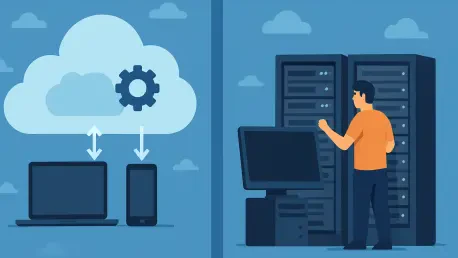Cloud computing has become the backbone of modern technology, transforming how businesses operate and innovate, and selecting the right platform to master in the current landscape can significantly shape a professional’s career trajectory. Amazon Web Services (AWS), Microsoft Azure, and Google Cloud Platform (GCP) stand as the titans of this industry, each carving out distinct spaces with their unique offerings and strengths. As enterprises increasingly pivot to cloud-based solutions for everything from data management to artificial intelligence, the decision to focus on one of these platforms transcends mere technical preference—it’s a strategic move that aligns with long-term career aspirations and industry trends. This exploration delves into the critical aspects of each provider, examining their market positions, technical capabilities, and the opportunities they present for skill development. By understanding these differences, professionals can make informed choices about where to invest their learning efforts in a rapidly evolving tech ecosystem.
Dominance in the Cloud Market
The hierarchy of cloud providers in 2025 paints a clear picture of market trust and adoption, with AWS maintaining its position as the leader, commanding a substantial 30% share globally. This dominance isn’t merely a statistic; it reflects a deep-rooted confidence among enterprises in AWS’s reliability, scalability, and extensive service catalog, which in turn translates into abundant job opportunities for those skilled in its ecosystem. Many organizations, from startups to Fortune 500 companies, rely on AWS for their infrastructure needs, making proficiency in this platform a safe and versatile choice for career growth. Beyond raw numbers, this leadership signifies a mature network of support, resources, and community engagement, which can be invaluable for learners navigating the complexities of cloud technologies. For those entering the field, aligning with a market leader like AWS often means access to a broader range of roles and industries eager to adopt its solutions.
While AWS holds the top spot, Microsoft Azure is not far behind, capturing 22% of the market and steadily gaining traction, particularly among businesses entrenched in Microsoft ecosystems. Azure’s appeal lies in its seamless integration with tools like Office 365 and Active Directory, making it a preferred option for enterprises that prioritize compatibility with existing systems. This growing adoption signals a robust demand for Azure expertise, especially in sectors like government and large corporations where Windows-based environments are common. Meanwhile, GCP, with a 12% share, is carving out a significant niche in tech-forward industries such as finance and healthcare. Though smaller in market presence, GCP’s focus on innovation and specialized services attracts organizations looking for cutting-edge solutions. Understanding these market dynamics is crucial, as they directly influence the availability of projects and roles tied to each platform, shaping the learning path for aspiring cloud professionals.
Technical Capabilities and Specialization
Each cloud giant offers a distinct set of technical strengths, catering to varied professional interests and industry needs, starting with AWS and its expansive portfolio of over 200 services. This vast array covers virtually every aspect of cloud computing, from storage and compute power to advanced analytics, positioning AWS as a comprehensive learning ground for those seeking broad exposure. Its versatility makes it an excellent fit for diverse use cases, whether supporting a small startup’s web hosting or powering a multinational’s complex data operations. For learners, this means an opportunity to develop a wide skill set that can be applied across multiple sectors, enhancing adaptability in a competitive job market. The sheer depth of AWS offerings also ensures that professionals can dive into specialized areas as their expertise grows, providing a long-term learning trajectory within a single ecosystem.
In contrast, Azure shines in hybrid cloud environments, offering tools like Azure Stack and Arc that enable smooth transitions between on-premises and cloud setups, a critical feature for many enterprises. This specialization appeals to businesses that are not ready to fully abandon legacy systems but still want to leverage cloud benefits, creating a unique demand for Azure skills in corporate settings. Additionally, Azure’s tight integration with Microsoft products ensures that professionals familiar with Windows environments can transition into cloud roles with relative ease. On the other hand, GCP distinguishes itself in areas like artificial intelligence, machine learning, and container management, with platforms like Vertex AI leading the way. This focus makes GCP particularly attractive to developers and data scientists who aim to work on innovative, data-intensive projects. Choosing a platform often comes down to matching these technical strengths with personal career goals and the specific demands of targeted industries.
AI Integration and Emerging Trends
Artificial intelligence has emerged as a cornerstone of cloud computing, with each provider investing heavily to integrate AI capabilities into their services, reflecting a broader industry shift toward intelligent solutions. AWS stands out with robust tools like SageMaker and Bedrock, which simplify the development and deployment of AI models for businesses of all sizes. These offerings cater to a wide audience, from beginners exploring machine learning to seasoned data scientists building complex algorithms, ensuring that AWS remains a strong contender for those looking to merge cloud and AI expertise. The emphasis on accessible AI tools also means that learners can quickly gain practical experience, a vital factor in a field where hands-on skills often outweigh theoretical knowledge. As industries increasingly rely on data-driven decision-making, proficiency in AWS’s AI suite could open doors to roles at the forefront of technological advancement.
Meanwhile, Azure is making significant strides in AI, backed by substantial investments and strategic partnerships, such as with OpenAI, to enhance tools like Copilot within its cloud infrastructure. This focus positions Azure as a leader for enterprises seeking to embed AI into their existing Microsoft-based workflows, creating a demand for professionals who can navigate these integrated systems. GCP, however, takes an AI-first approach, offering cutting-edge models and scalable data pipelines that appeal to those focused on machine learning and big data applications. Its leadership in areas like MLOps and containerized AI solutions makes it a go-to for tech innovators. The convergence of AI and cloud across all three platforms underscores a critical trend: future-ready skills must include AI literacy, regardless of the chosen provider. For learners, this means prioritizing platforms that not only offer strong AI tools but also align with the specific applications and industries they aim to serve.
Career Opportunities and Skill Development
When it comes to career prospects, the job market offers clear insights into the value of expertise in each cloud platform, with AWS leading the way in sheer volume of opportunities. Its widespread adoption across industries results in a high number of job listings, from entry-level positions to advanced architectural roles, making AWS certifications globally recognized and highly sought after by employers. This prevalence ensures that learners can find roles in diverse sectors, whether in tech giants or smaller firms adopting cloud solutions. Additionally, the structured learning paths and extensive resources available for AWS certifications provide a clear roadmap for skill development, helping professionals build confidence and credibility. For those starting out or looking to pivot into cloud computing, this abundance of openings and support can significantly ease the transition into a new career domain.
However, Azure and GCP also present compelling career paths, particularly in specialized fields, with Azure’s strength lying in enterprise environments where hybrid solutions and Microsoft integration are key priorities. Roles tied to Azure often appear in large organizations and government sectors, where certifications like Azure Administrator Associate carry significant weight. GCP, while smaller in overall market share, is gaining ground in industries like healthcare and finance, where its focus on AI and data analytics drives demand for skilled professionals. Beyond single-platform expertise, a growing trend toward multi-cloud strategies highlights the value of cross-platform knowledge, as many companies now combine services from multiple providers to optimize performance and reduce risks. This shift suggests that investing time in learning more than one platform could provide a competitive edge, positioning learners as versatile assets in a dynamic job market where flexibility is increasingly prized.
Navigating the Path Forward
Reflecting on the cloud computing landscape, it’s evident that AWS, Azure, and GCP each carve out unique niches that cater to diverse professional aspirations and industry needs. AWS stands as the versatile powerhouse, offering broad opportunities that appeal to a wide range of learners, while Azure solidifies its role as the enterprise favorite with seamless hybrid and Microsoft integrations. GCP, with its innovative edge in AI and data solutions, captures the attention of those pushing technological boundaries. The rise of multi-cloud approaches also underscores the growing importance of adaptability, as businesses seek to blend the strengths of multiple platforms. Looking ahead, the integration of AI and emerging fields like cybersecurity points to the skills that will define the next era of cloud expertise. For professionals navigating this decision, the key is to align learning choices with personal goals and industry demands, ensuring they are well-equipped to thrive in a tech-driven future.









